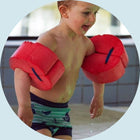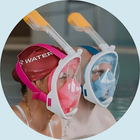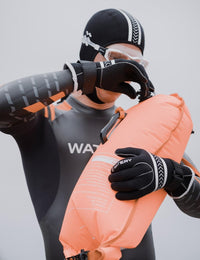No matter how well you look after your swimwear, it's (unfortunately) rare that your swimwear lasts forever. With countless hours of hard training in the pool, as a lifeguard on the edge or in the water as an instructor, a huge amount of wear and tear is put on your swimwear. This can result in colour fading, loose elastic bands or, in the worst case scenario, tears in the fabric that the swimwear is made of.
Wear and tear is inevitable, but there are still many factors you can adjust to minimise the wear and tear on your swimwear and extend the life of your swimwear.
1. Avoid the washing machine
The biggest mistake I see when it comes to swimwear maintenance for younger swimmers in my swimming club is the frequent use of the washing machine when it comes to cleaning swimwear. It's a quick and easy solution and ensures that all chlorine molecules leave the swimwear. The problem is that the lifespan of your swimwear disappears just as quickly as the chlorine molecules when you use the washing machine.
It's incredibly hard on your swimwear when you expose it to scalding hot water, soap, chemicals and a good shaking in the washing machine.

2. Avoid the tumble dryer
As a finishing touch after a trip to the washing machine, some swimmers give their swimwear a spin in the tumble dryer after washing. There is absolutely nothing positive to say about this, except that your swimwear will of course be dry and warm. But it's also this “nice” warmth that kills your swimwear.

Instead of using the tumble dryer, hang your swimwear to dry in the bathroom (or other rooms that are susceptible to moisture) or outside in the good spring weather. You'll not only save your swimwear, but also the building's electricity consumption.
If you want to be extra gentle on your swimwear, avoid hanging your swimwear from straps or other loose elastic bands, as this will remove the elasticity in the long run.
ATTENTION! If you are inexplicably pressed for time, you can use a blow-dryer or towel dryer to gently dry your swimwear over a short interval.
3. Rinse in cold water without soap after EVERY use
Even if your swimwear is made of durable materials, chlorine, sweat or other chemicals/liquids have never benefited the life of your swimwear. You should rinse your swimwear in cold water (WITHOUT soap) after every use. By using the cold water, you ensure that you do not cause unnecessary wear and tear on the elastane in your swimwear.

GET A DISCOUNT CODE WITH 10% OFF
The discount code can be used by all new customers on all products on the website, including the products recommended here in the article.
What are you waiting for? Get more out of your time in and on the water!
4. Don't wring your swimwear
However, when rinsing your swimwear with cold water, it's important that you don't finish by wringing your swimwear like you would wring a dishcloth to get the water out of your swimwear. This will only stretch the elastic in your swimwear.

Instead, squeeze or press the swimwear into a lump and squeeze the water out of your soaked swimwear instead.

5. Don't leave wet swimwear in your bag
Whether it's 5.00 in the morning or 10.00 at night, you should NEVER leave your wet swimwear in your bag. When you leave your wet swimwear in your bag overnight, you give bacteria and other microorganisms the perfect conditions to decompose your swimwear. In addition, you risk dissolving the materials in your swimwear if it's particularly humid. This can ultimately also break down the elastane in your swimwear.

Plus, a swimsuit, or a pair of trunks that has spent the night in a damp bag doesn't smell very good!
6. Don't wear your swimwear in the shower
Of course, you should wash yourself in the shower before starting your workout, preferably wearing a swimsuit. But that said, you shouldn't keep your swimsuit on when you wash with shampoo, conditioner, etc. afterwards. Your hair may be soft and smooth from the soap's chemicals, but unfortunately, the same goes for your swimwear. Shampoo and conditioner are just two of elastane's many enemies that you don't want to introduce your swimwear to.

In addition, there is another very important reason why you should never combine the use of soap with swimwear. Soap can bind an incredible amount of chlorine molecules. Soap residue from washing or shampoo can therefore have a significant impact on the air quality in your swimming pool.
7. Avoid sharing swimwear with each other
As much as possible, you should make sure that you are the only one using your swimwear. This is because, as you've probably already realised, swimwear adapts to your body and shape after you've worn it a few times. No two bodies are ever the same. When a new body uses your swimwear, your swimwear will also adjust slightly to that body. The swimwear may therefore appear looser in areas that used to sit close to your body. In addition, there will always be a minimal transfer of bacteria.

That said, you should of course help each other if you forget your swimwear at home, as it takes more than a single workout to break/loosen the swimwear's elastic bands.
Whether your swimwear is wearing out or not, here at Watery, we firmly believe that you can never have too much swimwear. This applies to swimsuits, trunks, bikinis, and competition swimwear.





















